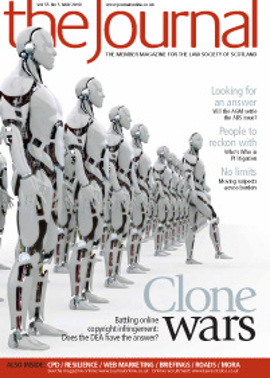Goodbye sick note
The recent introduction of the fit note will affect every Scottish business, so employers must ensure they’re taking the appropriate steps to comply with this new legislation.
Old-style sick notes have been replaced with the "fit note", as part of a bid to reduce the billions of pounds lost to the economy every year through absenteeism. More than 2.6 million Britons are on incapacity benefit and sick leave, which costs the economy £100bn and around 172 million working days each year.
Support
The idea is now to focus on what the employee can do rather than what they can’t do, which means that employers are required to accommodate those who can still perform parts of their job.
Like sick notes, fit notes are issued after seven days’ absence, but instead of simply indicating whether or not a patient should refrain from work, the fit note allows GPs to state that an individual may be fit for a return to work with certain employer support. The options are: a phased return to work; altered hours; a change in duties; or adaptations in the workplace.
An employer does not have to act on these recommendations, and in the event that it is not possible to do so the employee should be treated as still unfit for work.
However, it’s crucial that employers revise their absence policies to take account of the new certification process.
Relevant personnel should be assigned with the responsibility of deciding whether or not to accept the recommendations on fit notes and to ensure that any appropriate amendments and adaptations are made prior to the employee returning to work.
Caution should also be exercised with regard to an employer’s obligations under the Disability Discrimination Act, as there will inevitably be situations where an employee with a condition covered by the Act is deemed as fit for work with some adaptations in the workplace, and the employer’s obligations in this area are unchanged.
Collaboration
For the new procedures to work efficiently it’s necessary for a collaborative approach to be applied. The doctor will need to make comments on the fit note indicating the functional effects an individual’s condition will have on their role in the workplace and also how long the suggested changes need to apply for, up to a maximum of three months. In some cases it will be necessary for the doctor to reassess fitness for work during this period and to indicate if the patient needs to be seen again prior to taking up normal working.
As such, there’s a huge opportunity here to change the way people think about sick leave – i.e. rather than assuming that an individual will remain absent until they’re totally recovered, there should be an expectation that they’ll be able to return to work as soon as possible, with the support of their employer.
Companies will need to apply an objective approach when considering GPs’ recommendations. Where it’s not possible to implement these, the employee remains unfit for work and contractual sick pay or SSP will continue to be paid.
Lack of objectivity and consistency in such matters will lead to grievances being raised by employees, and it’s recommended that managers with responsibility for making these decisions receive the appropriate training and guidance.
Where amendments to the normal working pattern are possible, an appropriate review date will be set with the aim of the employee returning to normal working as soon as possible.
There’s a risk that some employers will turn a blind eye to the new legislation, due to a lack of understanding. It’s important for any company in this situation to familiarise themselves with the new rules and take time to understand the tools they have at their disposal to help manage staff absenteeism.
The changes in the system are aimed at allowing people to return to work sooner with the right support in place, and should be seen as a positive move as workplace absenteeism is a major cost in all UK sectors, both public and private.
In this issue
- Pro bono: making a difference to people's lives
- Goodbye sick note
- Like tears in the rain
- On level ground?
- Keeping tabs on the EU
- Counterstrike
- Supporting excellence
- The final roll of the dice
- Death and taxes
- Pick of the bunch
- Train to gain
- Law reform update
- Meeting the Deans
- Family feeling
- From the Brussels office
- Bank liaison back on track
- Resilience is the key
- Cast your net
- Outside the box
- Ask Ash
- Are you... experienced?
- Handover standoff
- Investing in dispute
- When Nature takes over
- Spilled milk?
- Armed with the law
- When is a "deed" not a deed?
- Blocked in
- Website review
- Book reviews
- Calling time on mora
- Raiders of the lost roads?






